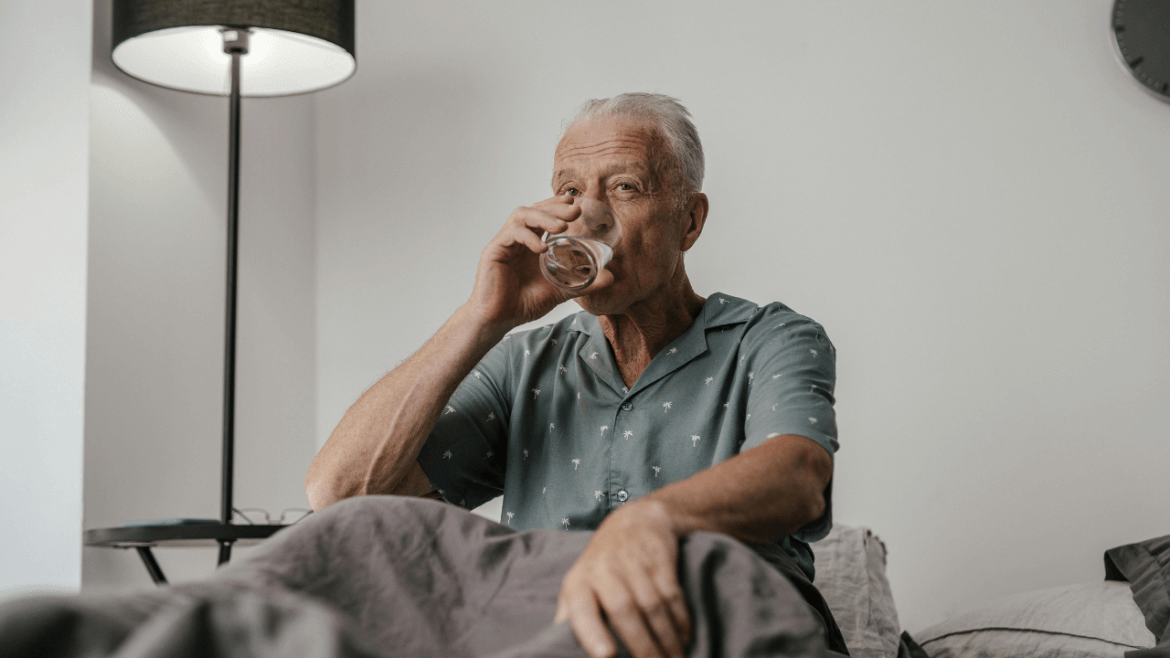Did you know that Leading Edge Senior Care has a Dementia Support Group? We meet monthly in Mesa. For more details <click here>
How To Get Seniors To Drink More Water
Hydration is essential for everyone, but it becomes even more critical as we age. Seniors often face unique challenges that make maintaining proper hydration difficult. As the body ages, thirst sensations decrease, and some medical conditions or medications can exacerbate dehydration risks.
However, ensuring seniors drink enough water is crucial for their overall health, energy, and well-being. Let’s explore how to encourage seniors to stay hydrated effectively and compassionately.
Understanding Why Hydration Is Vital
Water is the foundation of life, and its benefits extend far beyond quenching thirst. For seniors, proper hydration supports vital organ function, regulates body temperature, and promotes joint health. It can also improve cognitive function and mood, two areas often affected by dehydration. When seniors don’t drink enough water, they risk urinary tract infections, kidney problems, and even confusion or dizziness, which can lead to dangerous falls.
The importance of hydration cannot be overstated, yet many seniors struggle to drink enough water daily. Recognizing the barriers and addressing them is the first step to helping loved ones stay hydrated.
Identifying Common Barriers to Hydration
Seniors often experience reduced thirst signals, making it easy to overlook the need for water. Some may have mobility issues that make fetching a glass of water inconvenient. Others may avoid drinking fluids out of fear of frequent bathroom trips, especially if they struggle with incontinence.
Medical conditions such as dementia or stroke can further complicate hydration efforts. For those with swallowing difficulties, the act of drinking water may seem daunting. Additionally, some seniors simply don’t enjoy the taste of plain water, making them less likely to reach for a glass.
Addressing these barriers requires creativity, patience, and understanding. Fortunately, there are strategies that can turn hydration into a habit.
Practical Tips To Encourage Hydration
Make Water Accessible
One simple way to encourage hydration is to keep water within easy reach. Placing bottles or glasses in various locations around the home can serve as reminders to drink. For seniors with mobility challenges, lightweight water bottles with straws can be especially helpful.
Enhance Flavor Without Adding Sugar
Many seniors find plain water unappealing, but adding natural flavors can make a difference. A slice of lemon, a few mint leaves, or some cucumber slices can transform water into a refreshing treat. Low-sugar electrolyte drinks or herbal teas can also provide variety while boosting hydration.
Create a Routine
Habits are powerful. Incorporating water consumption into daily routines ensures it becomes second nature. For example, encourage seniors to drink a glass of water with every meal or medication. Morning routines can include a glass of water upon waking, setting the tone for the rest of the day.
Incorporate Water-Rich Foods
Hydration doesn’t always have to come from drinking. Foods like watermelon, oranges, cucumbers, and soups are excellent sources of water. Including these in a senior’s diet not only improves hydration but also adds nutritional value.
Offer Hydration in Smaller Quantities
Large glasses of water can feel overwhelming to some seniors. Instead, serve smaller portions throughout the day. Frequent, manageable sips are less intimidating and easier to incorporate into their routine.
Overcoming Emotional Resistance
For some seniors, the reluctance to drink water may stem from deeper emotional or psychological factors. They may feel embarrassed about needing frequent bathroom breaks or worry about becoming a burden. Compassionate conversations can help address these concerns.
Reassuring them about the importance of hydration and the positive effects it has on their independence and energy can change their perspective. Family members and caregivers can lead by example, drinking water together to create a sense of camaraderie.
Recognizing Signs of Dehydration
It’s essential to recognize the early signs of dehydration to prevent serious health issues. Dry mouth, dark urine, and lethargy are common symptoms. More severe dehydration can cause confusion, rapid heartbeat, or fainting.
If dehydration becomes frequent or severe, consult a healthcare professional. They may recommend specific hydration strategies or evaluate underlying medical conditions that contribute to the issue.
The Power of Patience and Persistence
Changing habits takes time. Seniors may initially resist increased water intake, but small, consistent efforts can yield significant results. Celebrating milestones, such as completing a daily hydration goal, can motivate them to continue.
Patience is key, especially for seniors with memory challenges. Gentle reminders and supportive encouragement can make all the difference. Caregivers and family members should approach the process with empathy, understanding that hydration is a shared responsibility.
A Healthier, Happier Future
Encouraging seniors to drink more water is about more than avoiding dehydration. It’s about improving their quality of life and supporting their physical and emotional well-being. By addressing barriers, creating enjoyable routines, and fostering open communication, families and caregivers can make hydration a positive, lasting habit.
Seniors deserve to feel their best, and proper hydration is a cornerstone of their overall health. Together, with thoughtful strategies and unwavering support, we can ensure they stay refreshed, energized, and happy.

